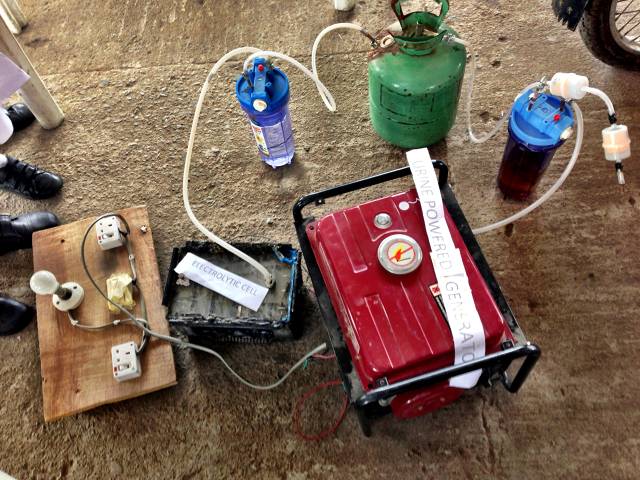By ‘Sola Fagorusi
 February 14th, 2015 in Nigeria would have remained a special date in our political history. It would have been the date set in history as the day the most keenly contested presidential election in the country held. It turned out to be like it was every other year. It was Saint Valentine’s Day and it seems he was keen on not sharing the date with anyone or event; at least in Nigeria! Twitter, Instagram and Facebook went abuzz with love notes, conversations, pictures, arguments and penetrating discussions around the celebration that is now observed on February 14 each year. Two of the hashtags caught my attention – #prevalentinebreakuplines and #NoHoodieNohoney. While the former was centred on hilarious reasons young men give for breaking off a relationship before February 14th every year, the other, which I participated in, reigned factual information into the online space.
February 14th, 2015 in Nigeria would have remained a special date in our political history. It would have been the date set in history as the day the most keenly contested presidential election in the country held. It turned out to be like it was every other year. It was Saint Valentine’s Day and it seems he was keen on not sharing the date with anyone or event; at least in Nigeria! Twitter, Instagram and Facebook went abuzz with love notes, conversations, pictures, arguments and penetrating discussions around the celebration that is now observed on February 14 each year. Two of the hashtags caught my attention – #prevalentinebreakuplines and #NoHoodieNohoney. While the former was centred on hilarious reasons young men give for breaking off a relationship before February 14th every year, the other, which I participated in, reigned factual information into the online space.
Social media is an interesting space in the reach it offers. It seems to be the only space in the world today where individuals of various ethnic lines, religious bias, social class and other demographies can come together to have a conversation irrespective of geography and time. The only thing all will need to have in common is internet access and a tool (phone, tablet, personal computer) with which to access the space. Nigerians are hilarious and that showed in the lines from the #prevalentinebreakuplines. It was even of note that they even found a political angle to it in a way that embraced the unity of all despite the prevailing political differences. Since guys are accused of always engineering breakups before valentine to avoid the financial commitments that come with the season, #prevalentinebreakuplines was about the most bizarre of reasons given. @Dappyboy0489 tweeted – ‘You don’t even respect me, I’m talking and you are busy breathing? It’s over! #PreValentineBreakUpLines’. Another from @DemobantY: You are always abbreviating ur texts, you want our children to be short abi? It’s OVER #PreValentineBreakUpLines. For @emisaw, his was ‘Why will you use seat belt in my car. So u are saying I can’t drive, u don’t trust me with your life? Oya get out #PreValentineBreakUpLines.’ A tweet had this – ‘JEGA postpone election nd u r jubilating, u must be selfish. You don’t love Nigeria. It’s over.’ Several thousands of other tweets were also poured into the space.
Not a few young people also used the date to propose to their loved one and also get friends and acquaintances in the space to know about it. Besides, it is difficult these days to keep a relationship outside the prying eyes of the public. With Facebook requesting that one updates a relationship status and with a girlfriend or boyfriend ready to share a selfie of the couple, it is only a matter of time before it’s public knowledge; a tag here, a mention there, another poke there is all it takes.
#NoHoodieNoHoney was however my favourite of the duo; by the time the about two hours twitter chat session ended, 234,838 accounts had been reached and 2,970,801 impressions made. It was a decent effort given the number of hours it took. As has always been the norm for decades now, young people, especially teenage girls are being pressured to prove their love by their boyfriends and in some cases it is also the other way round with the lady being the one to pressure their male loved ones into having casual sex. And so #NoHoodieNoHoney was about providing factual information for young people about the dangers of unprotected sex and also offer knowledge on Adolescent Sexual and Reproductive Health issues. In 140 characters, issues around early sexual debut, unwanted pregnancies, Sexually Transmitted Infections and sexual violence were discussed. Given sexual debut figures from the UNFPA which reveals that by age 18, 54% of girls and 19% of boys have had sex, this is a chief reason why ASRH issues should be properly mainstreamed into conversations in social media space where it is known that young people spend a minimum of 3-4 hours daily. Adolescence is a period of transition between childhood and adulthood. It is characterized by spurts of physical, psychological and social changes and this is what makes it a difficult time for most adolescents and hence the challenges attached to growing up. For clarity, ASRH is the body of knowledge and services that deal with the sexual reproductive health of young people ages 10 -24.
 Early sexual maturation for adolescents and teenagers, the socio-economic reality leading to transactional sex and the glamourisation of sex in the media continues to put adolescents in harm’s way. Adults today have a new responsibility to ensure that young people, especially adolescents and teenagers have the right information and can make decisions based on accurate set of facts presented to them. Contentious during the tweet chat was the mention of condom use for young people. A couple of tweets however put a right ring around it – ‘Like Life, Sex Happens & Every Young Person must be empowered with info. & skills to protect themselves.’ Another mentioned – Don’t be fooled! If you are sexually active, condoms are your best bet! ASRH is not about promoting promiscuity, it is about facing the reality. Health care providers for instance have observed how some parents are never willing to discuss sexuality in their homes and yet willing to discreetly procure abortion services for their children when the uneventful happens. Also strong was the push for abstinence for young people who are not sexually active. One tweet mentioned – ‘It is 2015 and there is nothing wrong with being a virgin if you are one. It is not old fashioned.’
Early sexual maturation for adolescents and teenagers, the socio-economic reality leading to transactional sex and the glamourisation of sex in the media continues to put adolescents in harm’s way. Adults today have a new responsibility to ensure that young people, especially adolescents and teenagers have the right information and can make decisions based on accurate set of facts presented to them. Contentious during the tweet chat was the mention of condom use for young people. A couple of tweets however put a right ring around it – ‘Like Life, Sex Happens & Every Young Person must be empowered with info. & skills to protect themselves.’ Another mentioned – Don’t be fooled! If you are sexually active, condoms are your best bet! ASRH is not about promoting promiscuity, it is about facing the reality. Health care providers for instance have observed how some parents are never willing to discuss sexuality in their homes and yet willing to discreetly procure abortion services for their children when the uneventful happens. Also strong was the push for abstinence for young people who are not sexually active. One tweet mentioned – ‘It is 2015 and there is nothing wrong with being a virgin if you are one. It is not old fashioned.’
Lack of information and skills for protection and inadequate knowledge among young people was reasonably addressed by the #NoHoodieNoHoney chat session. There is also a #NoHoodieNoHoney animation, part one and two on youtube.com that addresses the need for girls and ladies to also hold the ace as regards protecting themselves in any sexual relationship. Valentine is over but relationships will continue, boys will continue to peddle myths around why they need to have sex. Health care providers and peer educators need to look at using both traditional means and new media outlets to push more information to the public. It is only then that we can be sure that the next generation of parents will be HIV free and also well informed.
————————————————————————
 Sola‘Sola Fagorusi is a social entrepreneur and a prized freelance writer with a bias for youth and rural development. He started off as a youth staff with Action Health Incorporated in 2001. The Obafemi Awolowo University, Ile-Ife alumnus currently manages the programmes of OneLife Initiative, Nigeria. ‘Sola is a DESPLAY Africa (Africa’s foremost and most consistent annual youth democracy academy) fellow and has been on its faculty since 2011. Keenly interested in governance and pan-Africanism, he volunteers as online editor of YouthHub Africa; a cyber-community for young Africans involved in social change. He believes in the efficacy of oratory and writing as tools to drive developmental engagements. As a freelance writer, he spares time to pen thoughts on contemporary societal issues and is a weekly columnist with Nigeria’s most read daily ? Punch Newspaper. His training and capacity cuts across democracy and governance, leadership, micro-enterprise, ICT4D, SRH, value chains, development communication and policy issues. He tweets @SolaFagro and blogs at www.kadunaboy.com
Sola‘Sola Fagorusi is a social entrepreneur and a prized freelance writer with a bias for youth and rural development. He started off as a youth staff with Action Health Incorporated in 2001. The Obafemi Awolowo University, Ile-Ife alumnus currently manages the programmes of OneLife Initiative, Nigeria. ‘Sola is a DESPLAY Africa (Africa’s foremost and most consistent annual youth democracy academy) fellow and has been on its faculty since 2011. Keenly interested in governance and pan-Africanism, he volunteers as online editor of YouthHub Africa; a cyber-community for young Africans involved in social change. He believes in the efficacy of oratory and writing as tools to drive developmental engagements. As a freelance writer, he spares time to pen thoughts on contemporary societal issues and is a weekly columnist with Nigeria’s most read daily ? Punch Newspaper. His training and capacity cuts across democracy and governance, leadership, micro-enterprise, ICT4D, SRH, value chains, development communication and policy issues. He tweets @SolaFagro and blogs at www.kadunaboy.com







